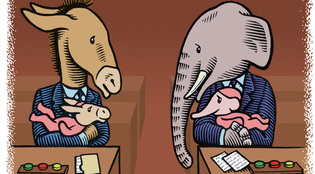 loading
loading
FindingsThe daughter effectLegislators with daughters are more liberal.  Gregory NemecView full imageLegislators with daughters vote more liberally on women's issues than do their colleagues without daughters. And the more daughters, the more liberal the legislator. In a recent study of voting patterns in the House of Representatives, Ebonya L. Washington, the Henry Kohn Assistant Professor of Economics, found that the influence of having daughters was most salient in votes on reproductive rights, including laws regulating abortion, international family planning, and access to birth control by teenagers. Washington expected the results, but with only 435 House members, she wasn't sure the effect would be large enough to show up in the data. Indeed, there were so few female Representatives that she could not demonstrate that daughters significantly swayed the votes of women in the House—only that daughters affected votes of fathers and of male and female lawmakers in the aggregate. Having daughters significantly predicted more liberal votes in 12 of 17 areas during the years studied, 1997 to 2004. Aside from reproductive rights, having daughters most strongly influenced votes on issues related to campaigns and elections, labor, and health. Washington measured the liberality of each U.S. Representative's voting record using roll call votes and ratings by three advocacy groups, two of them liberal (the National Organization of Women and the American Association of University Women) and one conservative (the National Right to Life Committee). In broader terms, Washington says her findings suggest the importance of "offspring effects." Research has already shown that peers, colleagues, parents, and siblings shape people's attitudes and behavior. Her study, published in March in the American Economic Review, shows that children influence parents—though it does not explain how. In discussing her findings, Washington speculated that although legislator-parents might vote for measures that they thought would minimize the cost of having a daughter, she suspects that the influence is more personal. "I believe, although I have no evidence, that it's actually through parent-child interaction. To the extent that men participate more in child-rearing, you can imagine that this might be likely to happen." She said the study suggests other research into the effects of offspring. She would be curious to know, for instance, whether Vietnam-era lawmakers who voted on the draft were influenced by having sons. In a real-world example similar to Washington's findings, United States Representative Debbie Wasserman Schultz (D-FL) had an intuition that the offspring effect might help her when she pushed to amend a food-labeling bill two years ago. The amendment preserved the right of states to warn about the dangers of mercury in fish, which can harm children and developing fetuses. Wasserman Schultz prevailed after seeking support from colleagues with children, including a key House Republican, conference chair Adam Putnam. She says Putnam told her that he'd broken ranks to vote with her because his wife was pregnant. Wasserman Schultz, the mother of two daughters and a son, says, "More and more, I find myself thinking about how the decisions we make are going to reverberate through my children's lives."
The comment period has expired.
|
|